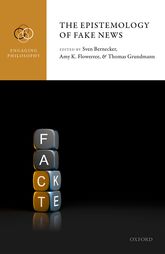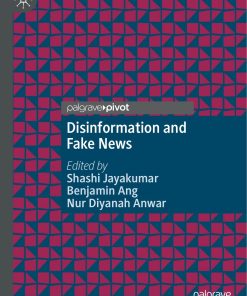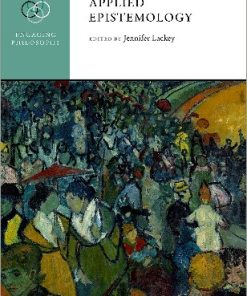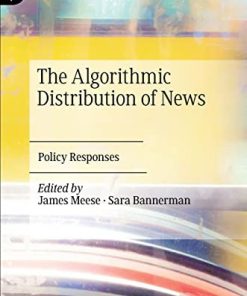The Epistemology of Fake News 1st edition by Sven Bernecker 0192609424 9780192609427
$50.00 Original price was: $50.00.$25.00Current price is: $25.00.
The Epistemology of Fake News 1st edition by Sven Bernecker – Ebook PDF Instant Download/DeliveryISBN: 0192609424 9780192609427
Full download The Epistemology of Fake News 1st edition after payment.

Product details:
ISBN-10 : 0192609424
ISBN-13 : 9780192609427
Author : Sven Bernecker
News is vital for a healthy democracy. Collective decision-making requires accurate, reliable information. Nevertheless, much of the information we encounter is inadequate for this task. And some–peddled by politicians, profiteers, bots and algorithms–is fake. Social media platforms and emerging technologies allow fake news to dominate our information landscape. An adequate understanding our current information landscape calls for a new discipline, the epistemology of fake news. The epistemology of fake news studies knowledge communication under imperfect conditions. This book is the first sustained inquiry into the new epistemology of fake news. The chapters, authored by established and emerging names in the field, pursue three goals. First, to analyse the meaning and novelty of ‘fake news’ and related notions, such as ‘conspiracy theory.’ Second, to discuss the mechanics of fake news, exploring various practices that generate or promote fake news. Third, to investigate potential therapies for fake news.
The Epistemology of Fake News 1st Table of contents:
1. The Challenge from Fake News
2. The Need for a New Epistemology of Fake News
3. Contours of an Epistemology of Fake News
4. Contributions to the Volume
Part I. Analyses of Fake News
1. Speaking of Fake News: Definitions and Dimensions
1. Introduction
2. Defining Fake News
3. Related Phenomena
4. The Dimensions of Fake News
5. The Definitions of Fake News
6. The Importance of Defining “Fake News”: Epistemic Threats, Boundary Work, and Paradigm Repair
7. Conclusion
2. Good News, Bad News, Fake News
0. Introductory Remarks
1. Understanding Fake News
2. News and News Sources
3. Fake News Versus News
4. Managing Fake News: Individual
5. Managing Fake News: Structural
3. The Fake News about Fake News
1. Introduction
2. The Term ‘Fake News’ as an Instrument of State Censorship
3. The Term ‘Fake News’ as an Instrument of Corporate Censorship
4. The Washington Post and ‘Fake News’: A Case Study
5. Academia and the ‘Science of “Fake News”’
6. Fake News and the Russian Threat
7. Conclusion
4. Conspiracy Theories and Evidential Self-Insulation
1. Introduction
2. Conspiracy Theories and Philosophical Methodology
3. Conspiracy Theories
4. Are Conspiracy Theories Irrational?
5. Objections and Replies
6. Conclusion
Part II. Mechanics of Fake News
5. Enquiry and Normative Deviance: The Role of Fake News in Science Denialism
1. Introduction
2. Enquiry and Its Normative Setting
3. The Role of Background Assumptions and Epistemic Filters in Shaping Epistemic Norms
4. Assessing Background Assumptions
5. Varieties of Normative Deviance
6. First Case Study: Flat Earth
7. Second Case Study: Anti-Vaxxer
8. Conclusions
6. Facing Epistemic Authorities: Where Democratic Ideals and Critical Thinking Mislead Cognition
1. What’s Wrong with (PDR) from an Epistemic Point of View
2. Why (PDR) Can Have Epistemically Dangerous Consequences
3. Remaining Deep Worries about Restricted Critical Thinking
4. Conclusion
7. Is Fake News Old News?
1. Definitions of Fake News and the Scope of this Investigation
2. Manipulation of Public Opinion: Three Models
3. The Putative Novelty of Fake News
4. Conclusion
8. How Vice Can Motivate Distrust in Elites and Trust in Fake News
1. Introduction
2. Justifying the Discussion
3. Interpersonal Vice
4. Epistemic Insensitivity
5. Are Elites Really Insensitive?
6. Epistemic Obstruction
7. Objections
8. Conclusion
9. Echo Chambers, Fake News, and Social Epistemology
1. Echo Chambers
2. Fake News
3. Bots
4. Social Epistemology
5. Conclusion
10. The Dissemination of Scientific Fake News: On the Ranking of Retracted Articles in Google
1. Introduction
2. Background: Why Retracted Articles May Be a Deep Problem for Google
3. Methodology
4. Results
5. Discussion
6. Conclusion
Part III. Therapies of Fake News
11. The Virtue of Epistemic Trustworthiness and Re-Posting on Social Media
1. Re-Posting and Its Epistemic Risks
2. Apparent News Sources as Sources of False Belief and as Objects of Misguided Trust
3. Re-Posting and the Further Risks of “Bent Credentialing”
4. Why Do the Risks of Re-Posting Call for an Epistemic Virtue to Address them?
5. Epistemic Virtues Relevant to Re-Posting
6. The Psychological Evidence about the Risks of Re-Posting
7. Empirical Evidence about the Benefits of Re-Posting
8. How Should the Epistemically Trustworthy Respond to this Evidence?
9. Conclusion
12. Fake News and Epistemic Rot; or, Why We Are All in This Together
1. Fake News and Epistemic Harms
2. Epistemic Harms of Fake News: The Simple Model of Communication
3. Epistemic Harms of Fake News: The Revised Model of Communication
4. Epistemic Harms of Fake News: The Modified Revised Model of Communication
5. Epistemic Rot
13. An Epistemic Defense of News Abstinence
1. Fake News
2. Fake News Environments
3. Motivated Ignorance
4. The Epistemic Value of Motivated Ignorance
5. The Justification of Motivated News Abstinence
6. Objections and Replies
7. Conclusion
14. Fake News, False Beliefs, and the Fallible Art of Knowledge Maintenance
1. Introduction
2. Acquiring Knowledge and Maintaining Coverage through Epistemic Routines
3. ‘Fake News’ in the Post-Truth Regime
4. News Production and Consumption under Conditions of the ‘Attention Economy’
5. Knowledge Maintenance in an Age of Fake News
15. Trust No One? The (Social) Epistemological Consequences of Belief in Conspiracy Theories
0. Introduction
1. Are Conspiracy Theories always Irrational?
2. The Division of Cognitive Labour and the Role of Trust Networks
3. Epistemological Effects of Belief in Conspiracy Theories
4. But Is Conspiracy-Thinking Always Bad?
5. How to Confront Conspiracy Thinking
People also search for The Epistemology of Fake News 1st:
the epistemology of fake news pdf
the epistemology of science
the epistemic threat of deepfakes
philosophy epistemology the problem of skepticism
the epistemology of ignorance
Tags:
The Epistemology,Fake News,Sven Bernecker,democracy,Collective decision
You may also like…
Uncategorized
Politics & Philosophy - Anthropology
Politics & Philosophy - Anthropology
Politics & Philosophy - Anthropology
Politics & Philosophy
Relationships & Lifestyle - Psychological Self-Help
Reference - Writing












